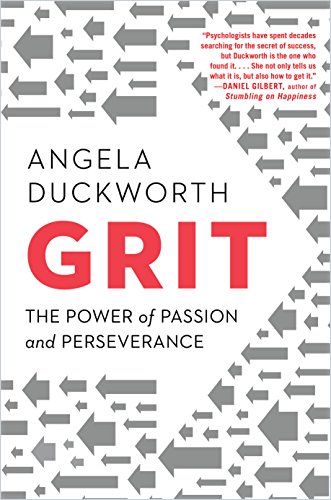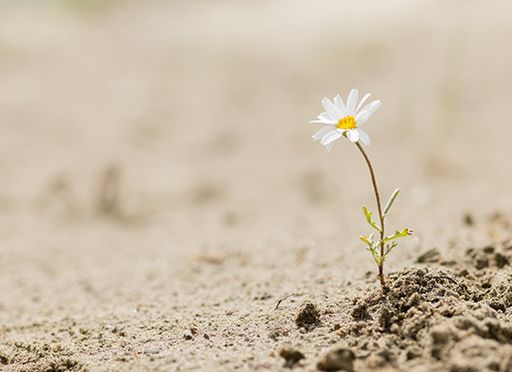Grit is the ability to persevere in the face of setbacks and disappointments, and to strive to improve even amid success.

Passion and Perseverance.
Angela Duckworth is a paragon of success by any measure. A MacArthur Genius and University of Pennsylvania professor of psychology, she founded an award-winning summer school for low-income children. She created and serves as scientific director of The Character Lab, and has advised the World Bank and NBA and NFL teams. She holds a Harvard BA in neurology, an Oxford degree in neuroscience and a University of Pennsylvania PhD in psychology. In her best-selling, acclaimed first book, she explores what it means to have “grit.”
An Ingenious Niche
Duckworth ranges wide for her illustrative examples, from crossword puzzles in The New York Times to the relationships between talent and effort and between skill and effort. Her consultations for NBA and NFL teams prove handy as she uses, for example, the Seattle Seahawks and their coach, Pete Carroll, as examples of institutionalized grit.
When I get knocked down, I’ll get back up. I may not be the smartest person in the room, but I’ll strive to be the grittiest…In the long run…grit matters more than talent.Angela Duckworth
This book carves out an ingenious market niche. Duckworth’s combination of winning anecdotes, how-to advice and relevant research place this work precisely amid the ranks of self-help books, “this-is-how-it-works” books and “this-is-how-what-works-applies-to-your-life” books of the Malcolm Gladwell range. The book’s strong sales reflect the intelligence of Duckworth’s niche creation – perfect for self-help fans who want to delve deeper than the usual material.
The Reading Experience
Duckworth does not, as you might worry based on her credentials, write like an academic or a scientist – and that’s good. She uses a simple, straightforward prose style. Her chapters function as stand-alone, complete entities. Each one raises a certain idea, practice or example that relates to grit and how to cultivate it. This works well for the episodic reader. You can pick up the book at any chapter’s beginning and glean worthwhile and even practicable advice. But that structure becomes a little tiring if you like to start a book at the beginning and read it through to the end.
Sports, Skill, Talent and Effort
Duckworth features interesting research, life tales and self-help advice offered with professorial distance. Some of her counsel is worthwhile and has practical applications. She doesn’t repeat herself – no stories appear twice – but she does tread the same ground in different guises. Given her rigorous education and credentials, she seems surprisingly susceptible to mythologies surrounding sports and how to apply elements of performance in athletics as life lessons. This proves quite reductive. Her embrace of coach Pete Carroll’s ethos of constant competition may be meaningful to her professional sports clients, but it seems to offer only scant help to her readers.
No matter what the domain, the highly successful had a kind of ferocious determination that played out in two ways: First, these exemplars were unusually resilient and hardworking. Second, they knew in a very, very deep way what it was they wanted. They not only had determination, they had direction.Angela Duckworth
Duckworth clearly and succinctly explores how talent relates to skills and how both relate to effort. She describes “talent” as a measure of how fast your “skill” advances when you apply yourself to your chosen task, be it playing the viola or shoveling the driveway. By her formula, “talent x effort = skill.” When you “take your acquired skills and use them,” you follow her second formula, “skill x effort = achievement.” Under this paradigm, native ability and even genius don’t count a lot unless you work hard to improve and use your natural or acquired gifts. What matters most, she says, is continual effort. You must persevere when you experience setbacks or disappointments, and especially when you are, by your own standards, successful. Life demands nonstop effort, which both requires and nourishes grit. You need grit to keep going; keeping going grants you more grit.
Duckworth quotes a renowned and revered lifelong ceramicist who told her, “The first 10,000 pots are difficult, and then it gets a little bit easier.” Celebrated for his genius since his youth, this potter never stopped trying to learn and improve; he had the discipline to work on his craft daily. Following that model, Duckworth takes a hard line: Unless you keep trying, your innate abilities amount to only “unmet potential.” Unless you strive, your talent and your learned skills become only what you might have done. Making your skills valuable takes continual exertion.
The “Grit Scale”
Duckworth writes at length about her Grit Scale, which she uses to predict someone’s success. With it, she forecast almost exactly which cadets at the US Military Academy at West Point would drop out before the end of their first year. West Point’s rigorous initial training tries to cut students who lack grit, and the Grit Scale proved the best tool so far at predicting who’d fail. The Grit Scale suggests 10 personal descriptors, such as, “I am a hard worker” or “I am diligent. I never give up.” Then, the Grit Scale asks respondents to list on a scale of one to five whether in describing themselves they agree or disagree with each statement. The Grit Scale may appear superficial, but Duckworth maintains that it predicts with remarkable accuracy who will be able to persevere in the face of physical and psychological discomfort.
Grit is made up of passion and perseverance. If you care deeply about what you do, you’re more likely to keep at it. If you keep doing something you love, you’re likely to love it more and more. Each fuels the other. And if you lack either dedication or love, you’ll have difficulty mustering the other. If you dislike what you do at work day after day, you won’t care about getting better at it. If you can’t be bothered to improve at what you do, you’re unlikely to embrace it. What matters, Duckworth teaches, is “consistency over time.” You prove passion and perseverance by working to hone your skill at a steady “intensity” level for enough time. If you start something and stop when improving gets tough, you lack grit. But don’t keep grinding at a task you despise and waste your grit. Instead, turn your attention to something that inspires you.
“The Hard Thing Rule”
Duckworth and her family adhere to the Hard Thing Rule. She, her husband and their two daughters each undertake a hard thing. Anyone can quit doing their hard thing, but only at a natural external “stopping point” – ballet season must end, a cycle of classes must come to a close, and so on. Nobody can quit in the middle just because their hard thing turns out to be harder than expected. But everyone picks his or her own hard thing. Duckworth and her husband never pick the hard things their daughters are going to do.
Our potential is one thing. What we do with it is quite another.Angela Duckworth
When both daughters reach high school, the Hard Thing Rule will have a new component: Both must make a two-year commitment either to the musical instruments they’ve been learning or to something new. Duckworth believes the Hard Thing Rule develops passion and perseverance and, as a result, grit. She argues that because the rule applies to everyone in the household, her children recognize it as a worthy tool for self-development. They don’t regard it as unfair. Everyone in the family faces the same challenge.
“Deliberate Practice”
Practice never makes perfect, but deliberate practice helps you improve. Swimming daily won’t make you faster, but deciding to add speed at every swim will. Deliberate practice includes: A stated objective that will “stretch” you – such as a faster lap-time; complete attentiveness and exertion – no half-measures; instant and helpful feedback – like a coach correcting your technique; and thoughtful replication with continual “refinement.” As Duckworth demonstrates, this level of deliberate practice requires and builds discipline, passion, perseverance – and grit.







